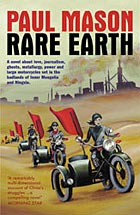Paul Mason’s novel Rare Earth opens with a disjointed trio of journalists and their two-steps-ahead interpreter zooming across Inner Mongolia looking for a nine o’clock news story. The team intends to inform the British public about China’s environmental situation, but, as journalist Brough grumpily realizes, they are permitted to do little more than translate China’s environmental propaganda.
Although the head of the team wants nothing more than back pats and promotions, journalist Brough will scramble out of a moving vehicle for the chance to interview unapproved sources. When the Chinese government’s propaganda department hears that Brough has interviewed — without authorization — the enraged neighbors of a factory spewing clouds of chlorine, Brough’s films are forcibly confiscated. Believing his companions murdered, Brough escapes into the desert only to be captured by a troop of carbine-hoisting, “subcutaneously angry” biker women. As China’s booming black market emerges from the desert, Brough realizes the compensatory restrictions placed on his ability to tell the story as he sees it. Brough must find new ways to communicate.
Author Paul Mason knows Brough’s subject and profession well. He is a BBC journalist who has reported on the mining and use of rare earth metals, a group of elements used to make both Prius batteries and guided munitions. Rare earth metals power both the green revolution Mason calls “our ecotopian wetdreams” as well as our military prerogative of “blowing people to smithereens.” During his own travels in China, Mason realized not only that these “green” materials are produced in ghastly factories, but also that the Chinese mines are becoming our sole source of the material. All but one of the non-Chinese rare earth mines have shut down due to economic competition and environmental concerns — rare earth metals could soon be mined only in the Chinese desert, creating a material monopoly that would force even more companies onto Chinese soil. Mason argues that our Western ignorance of our reliance on rare earth is exactly what makes it so dangerous.
Around the time of Mason’s initial article in 2009, China began limiting its rare earth exports, causing significant price hikes. Now, three years later, rare earth supplies have grabbed international attention. This week the United States, Japan, and the European Union filed a complaint to the World Trade Organization challenging China’s restrictive export policy and demanding fair access to these key materials, an initiative that some experts call “too late.”
Mason’s first novel is a second entry point into the story. This time, Mason has the leeway to use more than the AP list of approved sources. The intervention of floating ancestors and a whale-obsessed prostitute become essential threads in Brough’s story. Eccentric, surreal elements allow Mason to reveal profound truths through fantastical fictions. Rather than leaving readers to guess what has been left out, as in a news article, Rare Earth forces readers to filter reality through its virile, imaginative expanse.
When Brough arrives in China, he’s never heard of rare earth. Miss Chi shows him a sample:
“Try not to breathe it in,” she added. “There’s seventeen rare earth elements, know what an element is?”
A lightbulb lit dimly in Brough’s brain. She continued:
“Scandium, yttrium and the fifteen different lanthanoids. This is one of the lanthanoids. Neo-dym-ium. Nd. Number 60 on the Periodic Table.”
Last time he’d encountered the Periodic Table he’d been throwing darts at it in the common room at university, the other side of an entire adult life lived in fear and ignorance of science except where it could combat liver failure or sexually transmitted disease.
“So this is a kind of metal?”
“Found – in – the – Chi –nese – des –yourt,” Chi mocked him.
Rare Earth describes Brough’s awakening to this pollution-darkened world, albeit with a distracting dose of sex and cynicism. High-powered and never quite familiar, Mason’s characters leap from the page like the action figures of a kinky pop-up book. Environmental issues, business and government corruption, and social injustice are perpetual in this novel that reveals them as interconnected. Pressurized dialogue drives this un-documentary of excess, creating a novel that is brutal, gripping, and horrifyingly close to real.
This post may contain affiliate links.









